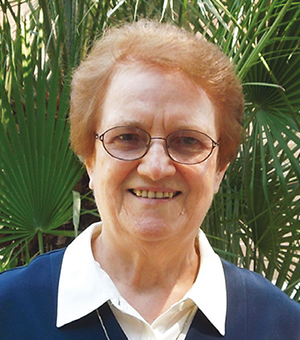April 1952: I was thirteen years old and had just entered the Congregation. The FSP community of Porto Alegre, in the State of Rio Grande do Sul, was bursting with young girls, the majority of them from big Catholic families descended from Italian, German and Polish immigrants…. Everyone wanted to become a nun, even though most of the girls returned home before realizing what this truly involved. At that time, the formation groups in the Porto Alegre community lacked just about everything. Nevertheless, we were all very happy and enthusiastic about the Pauline vocation. We worked, studied and played a lot. That year, our happiness increased exponentially when our mistresses told us that we had to be on our best behavior because someone very important would be coming to see us. In the following days, the suspense as to who this mysterious visitor might be ensured that we tried very hard to behave better, be more orderly and act more generously.
At last we received the eagerly-awaited news: Primo Maestro and Prima Maestra would be arriving in a few days! The house had to be cleaned. There were songs to learn. We had to make sure that our hair was neatly braided. And our clothes? We each had only two dresses and naturally we were expected to wear the nicer one for that occasion and be very careful not to get it dirty.
The big day finally arrived. We all went to the chapel to welcome our two saints. A few privileged girls were able to kiss the hand of the Founder and receive a hug from Maestra Thecla. The next day, we gathered in chapel to participate in a Mass celebrated by Primo Maestro, and with infinite joy (and a little fear) we received communion from his hands. Why were we afraid? Because it was rumored that the Founder was able to read hearts and would be able to see whether or not we had a vocation.
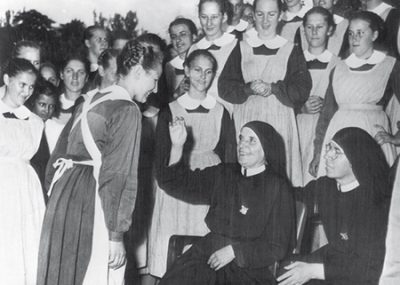 Maestra Thecla spoke to us in her kind and maternal way, urging us to be docile and as open as a book with our mistresses, and to rejoice in the fact that we were candidates to the Pauline life. She also encouraged us to pray more fervently and to love the Blessed Mother because she was the one who would form us to the Pauline life, if that was God’s will for us.
Maestra Thecla spoke to us in her kind and maternal way, urging us to be docile and as open as a book with our mistresses, and to rejoice in the fact that we were candidates to the Pauline life. She also encouraged us to pray more fervently and to love the Blessed Mother because she was the one who would form us to the Pauline life, if that was God’s will for us.
The few days that our Founders stayed with us were a feast, a retreat and a blessing that reinforced my desire to continue on a path that was still largely unknown to me. Now, almost 70 years later, I remember that visit as if it had taken place yesterday and those meetings that left all of us, adolescents and older candidates alike, with a deep yearning for God and an intense desire to become holy. Yes, holy, because we sensed the holiness of those two people, who were so serene and attentive to our situation, which lacked just about every comfort, but which filled us with enthusiasm and joy.
In the following years, we were blessed with several other visits on the part of Fr. Alberione and Maestra Thecla. We always looked forward eagerly to those occasions, which strengthened our desire to respond positively to the Lord’s call to the Pauline life. But what left an indelible mark on my life was my meeting with Maestra Thecla during her last visit to Brazil. I was a young professed at that time and the Congregation had just opened its first house in Australia.
Two young Brazilian professed sisters–Lidia Dalpozzo and Silvana Candian–had recently left to join the fledging community in Sydney. My heart burned with desire to follow in their footsteps in order to proclaim the Gospel to the people of Oceania. But how could I let my superiors know about my yearning? I felt small, ignorant, incapable and insufficient in everything. After a lot of pondering and praying, I resolved to take advantage of Maestra Thecla’s visit to tell her about my desire, and…who knows?… maybe she would be receptive to my appeal and would send me to Australia right away! Indeed, I felt like my heart was already there.
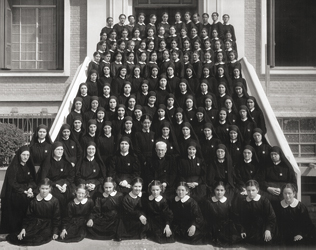 Maestra Thecla listened to me with the motherly attitude so characteristic of her and then remained silent for a time, while I waited with bated breath. And finally the verdict: “Perhaps it is better that you remain here.”
Maestra Thecla listened to me with the motherly attitude so characteristic of her and then remained silent for a time, while I waited with bated breath. And finally the verdict: “Perhaps it is better that you remain here.”
Certain that the words of Maestra Thecla revealed God’s will for me, her reply, although negative, did not frustrate my missionary dream. In fact, the Lord fulfilled that dream many years later in a completely different way by calling me to the service of government at the general level.
It was precisely during those years that I discovered and experienced the maternal and wise presence of Maestra Thecla. In her writings, and especially in my “dialogues” with her on my long journeys around the world to visit our communities, Maestra Thecla became to an ever-increasing degree my mother, teacher and friend. In my reflections and internal conversations with her, she taught me to love the sisters and to make my own their concrete situations, without distinctions as to their origins, ages and academic levels.
Recalling Maestra Thecla’s many teachings, there are three that stand out in particular for me. Her words, still very relevant today, were addressed to the Institute’s superiors, formators and apostolic-administrative coordinators–all of whom she urged to cultivate prayer and a maternal and solicitous attitude toward the sisters, helping them to assume their duties with freedom and responsibility.
Maestra Thecla was truly a mentor with regard to prayer. Through her example and teachings–which she received from Primo Maestro and also from the great spiritual guides in Christian Tradition–I learned to love the various levels and expressions of prayer: oral, meditative, contemplative, silent, personal and communal. Maestra Thecla was convinced that prayer is the pulse, the breath, of the spiritual life, and it is this that she taught us, saying: “Do you want to know if a soul is making spiritual progress? If a person prays, that is a sign that things are going well spiritually. If a person does not pray, she will not be able to stand on her feet.” Speaking to the superiors, she insisted that it was their duty to not only be women of prayer themselves, but also to help the sisters make prayer the first commitment of their day: “The first thing is prayer.”
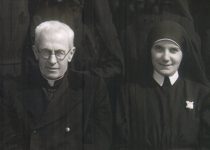 Something else I learned from her and that I have tried to put into practice in my service of governing is that mutual relationships must be based on respect and goodness, and that if one has the responsibility of governing, the relationships she establishes with others must be more than fraternal; they must express the Congregation’s maternity toward its members. Prima Maestra said to the superiors: “You must first of all be motherly toward the sisters.” And with great wisdom she showed everyone how to live this in our communities through the example of her own life and also through her writings. Her interest, care and accompaniment of each sister’s personal situation was the way she lived her maternity in the Congregation.
Something else I learned from her and that I have tried to put into practice in my service of governing is that mutual relationships must be based on respect and goodness, and that if one has the responsibility of governing, the relationships she establishes with others must be more than fraternal; they must express the Congregation’s maternity toward its members. Prima Maestra said to the superiors: “You must first of all be motherly toward the sisters.” And with great wisdom she showed everyone how to live this in our communities through the example of her own life and also through her writings. Her interest, care and accompaniment of each sister’s personal situation was the way she lived her maternity in the Congregation.
I think we can attribute to her what the Apostle Paul experienced in relation to his communities and to the people he generated in faith: “Who is weak and I am not weak? Who is made to stumble and I am not indignant?” (2 Co. 11:29) At Prima Maestra’s funeral, Fr. Alberione reminded us that she is the only Mother of our Congregation: “You will have many superiors but your sole Mother is Thecla Merlo.” Her way of relating to others, of exercising the service of governing, was a constant example and teaching for me.
Genuine motherhood translates above all into the ability to help a person grow in freedom and responsibility. Under this aspect too, Maestra Thecla proved to be an expert teacher and her advice to the superiors of our Institute has always been a great help to me. Regarding freedom, she said: “It often happens that when we are ordered to do something, we don’t want to do it. When, instead, the matter is left to our initiative, we do it with enthusiasm because it seems that everything depends on our good will.”
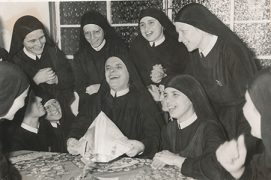 Reading her writings,1 I find it striking to note how much Prima Maestra valued the words and actions of the sisters. She was convinced that by respecting the creativity and responsibility of each member, the Congregation’s initiatives would multiply and the apostolate would develop. I think it was precisely this attitude of trust in the sisters and in their sense of responsibility that Maestra Thecla tried to instill in the superiors. She tirelessly recommended these two “secrets” to them and to those in charge of various apostolic sectors, and these “secrets” helped to fuel the extraordinary development of our Congregation.
Reading her writings,1 I find it striking to note how much Prima Maestra valued the words and actions of the sisters. She was convinced that by respecting the creativity and responsibility of each member, the Congregation’s initiatives would multiply and the apostolate would develop. I think it was precisely this attitude of trust in the sisters and in their sense of responsibility that Maestra Thecla tried to instill in the superiors. She tirelessly recommended these two “secrets” to them and to those in charge of various apostolic sectors, and these “secrets” helped to fuel the extraordinary development of our Congregation.
Besides suggesting to the superiors that they govern in a way characterized by prayer, a motherly spirit and encouragement of the sisters to freely and responsibly live their vocation and all it entailed, Maestra Thecla’s writings, conferences and meditations contain a wealth of other suggestions as to how one can serve God with complete self-donation in whatever service she is asked to carry out. Today too, Prima Maestra reminds us: “Learn continually from everyone and everything.” This is what we mean by Pauline studiosità. And she adds: “Be smart!” with the wisdom of those who cannot afford to waste a minute of time.
Thank you, Maestra Thecla, for all that you have taught me. Please continue to teach me to live like you did, namely: seeking always and in everything the glory of God and the good of others.
Sr. Maria Antonieta Bruscato, fsp
_________
1 The words of Prima Maestra quoted here are from the book, Un cuor solo e un’anima sola: Conferenze e Meditazioni (1954-1963).
